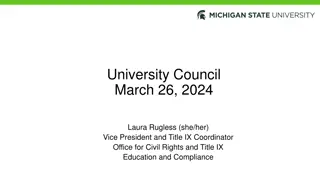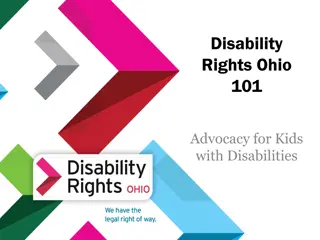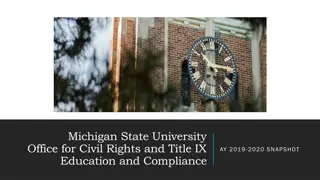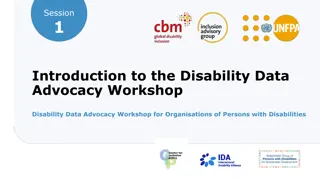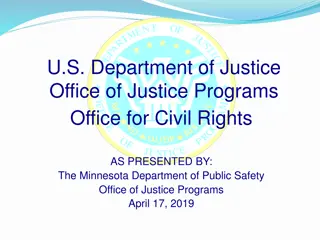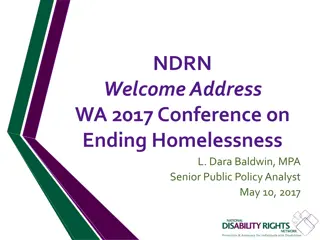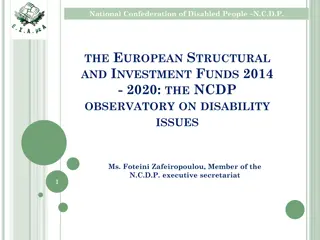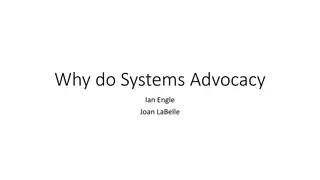Understanding OCR: Office for Civil Rights and Disability Advocacy
Lauren Eversole, a Senior Staff Attorney, is actively involved in advocating for the rights of individuals with disabilities under various federal programs. She is a member of the Florida and North Carolina Bars and has a strong educational background in history, law, and social work. Disability Rights Florida, a not-for-profit corporation, aims to protect and advocate for the rights of Floridians with disabilities through legal and legislative strategies. Their mission is to promote dignity, equality, and freedom of choice for persons with disabilities. Learn about OCR, its laws, filing complaints, and the resolution process.
Download Presentation

Please find below an Image/Link to download the presentation.
The content on the website is provided AS IS for your information and personal use only. It may not be sold, licensed, or shared on other websites without obtaining consent from the author. Download presentation by click this link. If you encounter any issues during the download, it is possible that the publisher has removed the file from their server.
E N D
Presentation Transcript
The ABCs of OCR (Office for Civil Rights) Lauren Eversole, Sr. Staff Attorney Family Caf 2023 1
Lauren Eversole Lauren Eversole is a member of the Florida and North Carolina Bars and is admitted to the U.S. District Courts for the Southern, Middle, and Northern Districts of Florida. She earned her Bachelors of Arts in History from the University of North Carolina at Chapel Hill. In addition to a law degree from Charleston School of Law, Ms. Eversole has a Masters of Social Work from the University of South Carolina. Ms. Eversole is a Senior Staff Attorney with DRF on the Advocacy, Education, and Outreach Team. She has worked for DRF for seven years, primarily advocating for the rights of children and adults with disabilities under state law, the Individuals with Disabilities Education Act, Section 504 of the Rehabilitation Act, and the Americans with Disabilities Act. 3
Disability Rights Florida Funding, responsibility, and authority under nine federal programs to protect and advocate for the rights of Floridians with disabilities A not-for-profit corporation since 1977 Offices in Tallahassee, Gainesville, Tampa, and Hollywood Satellite offices in several other communities 5
Our Mission To advance the quality of life, dignity, equality, self- determination, and freedom of choice of persons with disabilities through collaboration, education, advocacy, as well as legal and legislative strategies. 6
Overview What is OCR? What Laws Does OCR Enforce? When Should You File with OCR? How to File an OCR Compliant? What happens After You File an OCR Complaint? 7
What is OCR? (1 of 2) U.S. Department of Education Office for Civil Rights Sub-agency of the U.S. Department of Education that is primarily focused on enforcing civil rights laws prohibiting schools from engaging in discrimination. Washington D.C. Headquarters (HQ) Twelve (12) Regional Offices OCR Regional Office in Atlanta serves Georgia, Tennessee, Alabama, and Florida. Investigates and resolves complaints of discrimination. 8
What Laws Does OCR Enforce Title II of the Americans with Disabilities Act (ADA) Section 504 of the Rehabilitation Act of 1973 Title VI of the Civil Rights Act Title IX of the Education Amendments Act Age Discrimination Act of 1975 Boy Scouts of American Equal Access Act 9
ADA, Title II, and Section 504 (1 of 2) ADA, Title II State and Local Government Entities, including public schools Section 504 Recipients of Federal Funding Section 504 and ADA, Title II prohibit qualified individuals, on the basis of disability, from being excluded from participation in, being denied the benefits of, or otherwise subjected to discrimination by recipients of federal financial assistance or by public entities. 10
ADA, Title II, and Section 504 (2 of 2) Same Definition of Disability Under ADA and Section 504 Physical/mental impairment that substantially limits 1 or more major life activity, record of impairment, or regarded as Broad Coverage Definition of Qualified Elementary and secondary educational level: qualified means a student with a disability of an age at which students are provided elementary and secondary educational services or a student to who a state is required to provide a free and appropriate public education under the Individuals with Disabilities Act (IDEA) Postsecondary level: qualified means a student with a disability who meets the academic and technical standards requisite for admission or participation in the institution s educational program or activity 11
When to File with OCR (1 of 2) Elementary and Secondary Program Access (e.g. extracurriculars, field trips, before- and after-school care programs, architectural barriers) Failure to provide a reasonable modification Failure to provide an auxiliary aid or service (e.g. effective communication) 504 Plan issues (e.g. failure to implement a 504 plan, failure to conduct a manifestation determination) Retaliation OCR also enforces the rights of parents with disabilities. 12
When to File with OCR (2 of 2) Postsecondary Education Failure to provide an academic adjustment (e.g. extended time, reduced course load, course substitution, notetakers, recording devices, sign language interpreters, accessible on campus housing) Institution imposed a surcharge based on disability Retaliation In providing an academic adjustment, a school is not required to lower or waive essential requirements. 13
How To File an OCR Complaint (1 of 5) Anyone may file a complaint. You may complain on behalf of another person or group. Timelines: 180 days of the last act of discrimination If your complaint involves matters that occurred longer ago than this, you may qualify for a waiver. Examples of Waivers: Untimely, but file within 60 days of . . . Recovering from an incapacitating illness Conclusion of a recipient s internal grievance procedure First becoming aware of discrimination 14
How to File an OCR Complaint (2 of 5) Online You may file using OCR s electronic complaint form, found here: https://www2.ed.gov/about/offices/list/ocr/complaintintro.html Mail, Fax, or Email: You may fill out OCR s Discrimination Complaint Form (link below) and mail, fax, or email to D.C. HQ and/or your regional office (Atlanta): https://www2.ed.gov/about/offices/list/ocr/complaintform.pdf You may write your own letter and mail, fax, or email to D.C. HQ and/or your regional office (Atlanta), but you must include certain information in your letter. 15
How to File an OCR Complaint (3 of 5) Information to include in your own letter: The complainant s name, address, and if possible, a telephone number where the complainant may be reached during business hours Information about the person(s) or class of persons injured by the alleged discriminatory act(s) (names of the injured person(s) are not required) The name and location (city and state) of the institution that committed the alleged discriminatory act(s) A description of the alleged discriminatory act(s) in sufficient detail to enable OCR to understand what occurred, when it occurred, and the basis for the alleged discrimination (e.g. disability) 16
How to File an OCR Complaint (4 of 5) Contact Information for D.C. HQ and Regional Offices: https://www2.ed.gov/about/offices/list/ocr/addresses.html Contact Information for Atlanta Regional Office (Serves Florida): U.S. Department of Education 61 Forsyth Street S.W., Suite 19T10 Atlanta, GA 30303-8927 Telephone: (404) 974-9406 Fax: (404) 974-9471 Email: OCR.Atlanta@ed.gov You may contact OCR for technical assistance. 17
How to File an OCR Complaint (5 of 5) Helpful Resources while filing OCR Case Processing Manual (CPM): Provides information on how OCR investigates and resolves complaints https://www2.ed.gov/about/offices/list/ocr/docs/ocrcpm.pdf How to File a Complaint with OCR webpage: https://www2.ed.gov/about/offices/list/ocr/docs/howto.html?src=rt Reading Room: You can research past OCR case resolutions https://www2.ed.gov/about/offices/list/ocr/frontpage/faq/readingroom.html 18
OCR Consent Form A CONSENT FORM may be required to in addition to the complaint when the disclosure of the identity of the complainant is necessary in order to resolve the complaint. OCR will require written consent before proceeding. OCR may close the case if the consent form is not provided. You may send via fax, email, or mail. The consent form can be found here: https://www2.ed.gov/about/offices/list/ocr/edlite-consentform.html 19
What Happens Next? (1 of 2) OCR will evaluate the complaint for sufficiency (e.g. anonymous correspondence, inquiries that solely seek advice, or oral and not written communications may be deemed insufficient). OCR will evaluate if it has jurisdiction Does the complaint allege discrimination based on race, color, national origin, sex, disability, or age? Is the entity being complained of a recipient of federal funds (Section 504) or state or local government entity (ADA, Title II)? 20
What Happens Next? (2 of 2) OCR will assign a case number and establish a file. OCR will send an acknowledgement letter to the complainant that acknowledges, in writing, the receipt of the complaint informs the complainant that the complaint will be evaluated (e.g. timeliness or waiver) to determine whether OCR will proceed to investigate the allegations and that further communications about complaint processing will be forthcoming. OCR will open the complaint allegations for investigation and will notify you in writing of such. 21
Possible Outcomes (1 of 4) Rapid Resolution Process (RRP) Expedited case processing approach that can be used to resolve the case either during the evaluation stage or after OCR notifies the complainant that it is opening an investigation. If OCR determines that the complaint is appropriate for RRP, it will contact the recipient to determine if the recipient is interested in immediately resolving or has taken action to resolve the complaint allegations. 22
Possible Outcomes (2 of 4) Facilitated Resolution Between the Parties (FRBP) The parties may voluntarily resolve the complaint allegations. If OCR determines that the complaint is appropriate for FRBP, it will contact the parties to offer this resolution option. It is Confidential. The Investigation can be suspended for 30 calendar days. OCR s Role in FRBP Impartial, confidential facilitator between the parties; Inform the parties of the procedures; Review allegations with the parties and assist both parties in understanding the pertinent legal standards and possible remedies; Offer assistance with reducing any resolution to writing. When an agreement is reached, OCR will issue a closure letter reflecting the resolution of the complaint by agreement of the parties. OCR will not monitor. 23
Possible Outcomes (3 of 4) Resolution Agreement Reached During an Investigation Can occur any time when, prior to the point when OCR issues a draft letter of finding, the recipient expresses an interest in resolving the allegations. OCR determines that it is appropriate to resolve the allegations through a resolution agreement. Once a resolution agreement is reached, OCR will monitor its implementation until the recipient has fulfilled the terms and obligations of the agreement. 24
Possible Outcomes (4 of 4) Investigative Determinations At the conclusion of an investigation, OCR will determine, using a preponderance of the evidence standard, whether: There is insufficient evidence to support a conclusion of noncompliance, or The evidence supports a conclusion of noncompliance. Insufficient Evidence Determination OCR will issue a letter of findings to the parties explaining the reasons for its decision. OCR will notify you of its appeal options. Noncompliance Determination OCR will issue a letter of findings and will initiate negotiating a resolution agreement with the recipient. Once a resolution is reached, OCR will monitor. 25
Benefits of Filing with OCR Neutral Fact-Finder Enforcement Authority Can Address Systemic Problems and Provide Systemic Relief Can Provide Monitoring Can Educate Entities on Legal Obligations 26
Questions? 27
Contact Us: 800.342.0823 www.DisabilityRightsFlorida.org 28



